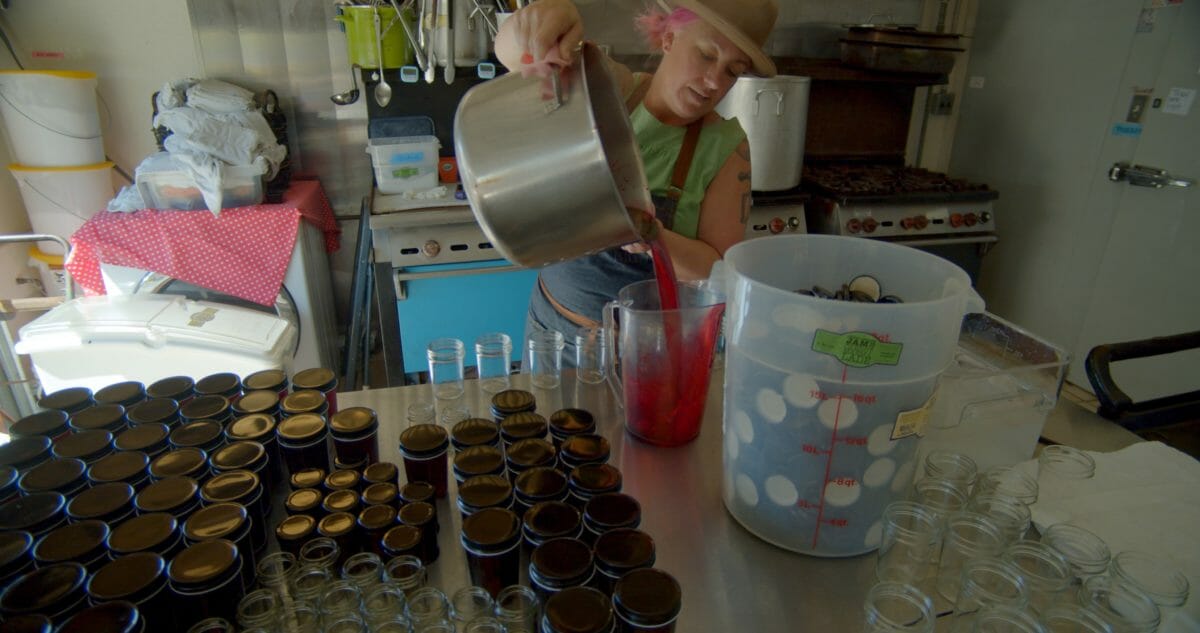California Chef Turns Waste into Gold for Small Farmers
A jammaker’s mission to rescue surplus produce is gaining steam faster than she can say ‘marmalade.’
California Chef Turns Waste into Gold for Small Farmers
A jammaker’s mission to rescue surplus produce is gaining steam faster than she can say ‘marmalade.’

Tabitha Stroup's Terroir in a Jar is trying to put a dent in global food waste.by American Huney Photography
Early summer in coastal Santa Cruz, California is better known for “June gloom” than scorching heat waves. So, when temperatures spiked to 100 degrees last June, rookie farmer Heidi Cartan started to panic.
All of the strawberries on her fledgling, four-acre urban farm, Common Roots Farm, ripened at once. There were more berries than she could possibly sell at her farm stand, or through her CSA, and more, even, than she could give to her volunteers or feed to her chickens. “The clock was ticking,” says Cartan. “It was bearing down on me that these were going to go bad.”
Then, by a stroke of luck, she was connected with a chef named Tabitha Stroup, who turns farmers’ unsellable produce into jams and other products. Stroup provides this service to two dozen growers—and counting—through her year-old endeavor, Terroir in a Jar, which rescued 35,000 pounds of produce from the waste stream in its first six months. This year, Stroup expects to do 300,000.
Common Roots Farm—a nonprofit designed to be accessible for disabled staff and helpers, and founded by 10 families with grown disabled children—called upon its volunteer bank, and together they harvested 120 pounds of strawberries in one morning. Cartan cranked up the AC in her son’s wheelchair-accessible van, packed it full of fruit-stuffed tote bags and rushed to Stroup’s commercial kitchen across town.
A week later, Common Roots Farm bought that surplus back in the form of syrups, shrubs and marmalades at wholesale distribution cost and went on to sell them at a 100-percent markup. “That’s the kind of thing that makes the difference between a small farm staying alive financially and not,” says Cartan.

Terroir in a Jar is part of an explosion of efforts trying to put a dent in the global food waste problem—a big task, given that nearly 50 percent of produce goes unused. But, amidst a boom in the “ugly produce” marketplace, Stroup says she is pursuing a unique angle: saving the “funky monkeys,” in her words—those unsellable, bruised, bumpy, overripe, overly juicy and excess fruits and veggies—from going to waste, while giving small, struggling farmers a much-needed fiscal boost.
“[Small farmers] are struggling, but they’re doing it because they love it,” says Stroup. “And they deserve the opportunity to make more money.”
Stroup tailors each farm’s creations to evoke a unique sense of place, or terroir. For example, when the 45-acre organic Everett Family Farm had strawberries in need of saving, Stroup strolled through its lush fields and noted how herbaceous and earthy it smelled. “You can smell the tarragon when the sun is on it,” she says. With this in mind, she made a strawberry tarragon shrub and a culinary vinegar.
The chef’s “a-ha” moment came over a year ago when she was purchasing produce for her artisanal jam company, Friend in Cheeses. “I had this one farmer—gosh, I love them—a small, sweet family [with] a few acres, and they had an overabundance of peppers,” she says. “I was getting them for $.50/pound at the end of the season and I was like ‘that’s fucked up.’ I mean—great for me, but that’s a loss for them. So, how can I turn this around? How can I grab that same produce, turn it into magic for these farmers and sell it back to them at wholesale distribution?”
She tossed the idea out to her network and has been inundated ever since. “Farmers are clamoring at us,” she says. The demand is more than Stroup can handle in her lively 600-square-foot kitchen, where her team of three can whip up a thousand jars in one day. (Notably, she hires women only, from the Homeless Garden Project and other programs that are “helping women rise above poverty and addiction.”) Their speed is critical: During strawberry season, one of the larger growers they work with was dropping off 500 pounds of strawberries a week. On a recent morning, the staff was staring down 300 pounds of Meyer lemons that needed peeling and juicing.
“There’s too much food. I feel like Indiana Jones with the boulder behind me,” says Stroup. She is searching for an angel investor to help the business scale, and she has plans to pollinate the Terroir in a Jar model to agricultural areas across the country. “I don’t want this for myself,” she says. “This is something I’m trying to build so every community could have an outpost.”
Follow us
This work is licensed under a Creative Commons Attribution-NoDerivatives 4.0 International License.
Want to republish a Modern Farmer story?
We are happy for Modern Farmer stories to be shared, and encourage you to republish our articles for your audience. When doing so, we ask that you follow these guidelines:
Please credit us and our writers
For the author byline, please use “Author Name, Modern Farmer.” At the top of our stories, if on the web, please include this text and link: “This story was originally published by Modern Farmer.”
Please make sure to include a link back to either our home page or the article URL.
At the bottom of the story, please include the following text:
“Modern Farmer is a nonprofit initiative dedicated to raising awareness and catalyzing action at the intersection of food, agriculture, and society. Read more at <link>Modern Farmer</link>.”
Use our widget
We’d like to be able to track our stories, so we ask that if you republish our content, you do so using our widget (located on the left hand side of the article). The HTML code has a built-in tracker that tells us the data and domain where the story was published, as well as view counts.
Check the image requirements
It’s your responsibility to confirm you're licensed to republish images in our articles. Some images, such as those from commercial providers, don't allow their images to be republished without permission or payment. Copyright terms are generally listed in the image caption and attribution. You are welcome to omit our images or substitute with your own. Charts and interactive graphics follow the same rules.
Don’t change too much. Or, ask us first.
Articles must be republished in their entirety. It’s okay to change references to time (“today” to “yesterday”) or location (“Iowa City, IA” to “here”). But please keep everything else the same.
If you feel strongly that a more material edit needs to be made, get in touch with us at [email protected]. We’re happy to discuss it with the original author, but we must have prior approval for changes before publication.
Special cases
Extracts. You may run the first few lines or paragraphs of the article and then say: “Read the full article at Modern Farmer” with a link back to the original article.
Quotes. You may quote authors provided you include a link back to the article URL.
Translations. These require writer approval. To inquire about translation of a Modern Farmer article, contact us at [email protected]
Signed consent / copyright release forms. These are not required, provided you are following these guidelines.
Print. Articles can be republished in print under these same rules, with the exception that you do not need to include the links.
Tag us
When sharing the story on social media, please tag us using the following: - Twitter (@ModFarm) - Facebook (@ModernFarmerMedia) - Instagram (@modfarm)
Use our content respectfully
Modern Farmer is a nonprofit and as such we share our content for free and in good faith in order to reach new audiences. Respectfully,
No selling ads against our stories. It’s okay to put our stories on pages with ads.
Don’t republish our material wholesale, or automatically; you need to select stories to be republished individually.
You have no rights to sell, license, syndicate, or otherwise represent yourself as the authorized owner of our material to any third parties. This means that you cannot actively publish or submit our work for syndication to third party platforms or apps like Apple News or Google News. We understand that publishers cannot fully control when certain third parties automatically summarize or crawl content from publishers’ own sites.
Keep in touch
We want to hear from you if you love Modern Farmer content, have a collaboration idea, or anything else to share. As a nonprofit outlet, we work in service of our community and are always open to comments, feedback, and ideas. Contact us at [email protected].by Elizabeth Limbach, Modern Farmer
March 29, 2020
Modern Farmer Weekly
Solutions Hub
Innovations, ideas and inspiration. Actionable solutions for a resilient food system.
ExploreExplore other topics
Share With Us
We want to hear from Modern Farmer readers who have thoughtful commentary, actionable solutions, or helpful ideas to share.
SubmitNecessary cookies are absolutely essential for the website to function properly. This category only includes cookies that ensures basic functionalities and security features of the website. These cookies do not store any personal information.
Any cookies that may not be particularly necessary for the website to function and are used specifically to collect user personal data via analytics, ads, other embedded contents are termed as non-necessary cookies.
Thank you so much for getting this message out xo
Tabitha
Brilliant. The first article ever written about Tabitha that ever quoted her correctly and spelled her business name right! Well written and properly researched.
Tabitha is a rock star and innovator when it comes to reducing food waste. Her products are amazing, she constantly thinks outside of the box, and is truly passionate about what she does. I can not recommend her products enough; her Terroir in a Jar as well as her Friend in Cheeses products are top notch! They are a Must Try! Slap some jam on that!!
This is amazing… I am interested in doing this in Texas – combined with helping Rescued Trafficated Women – would be nice to talk…
Tracy